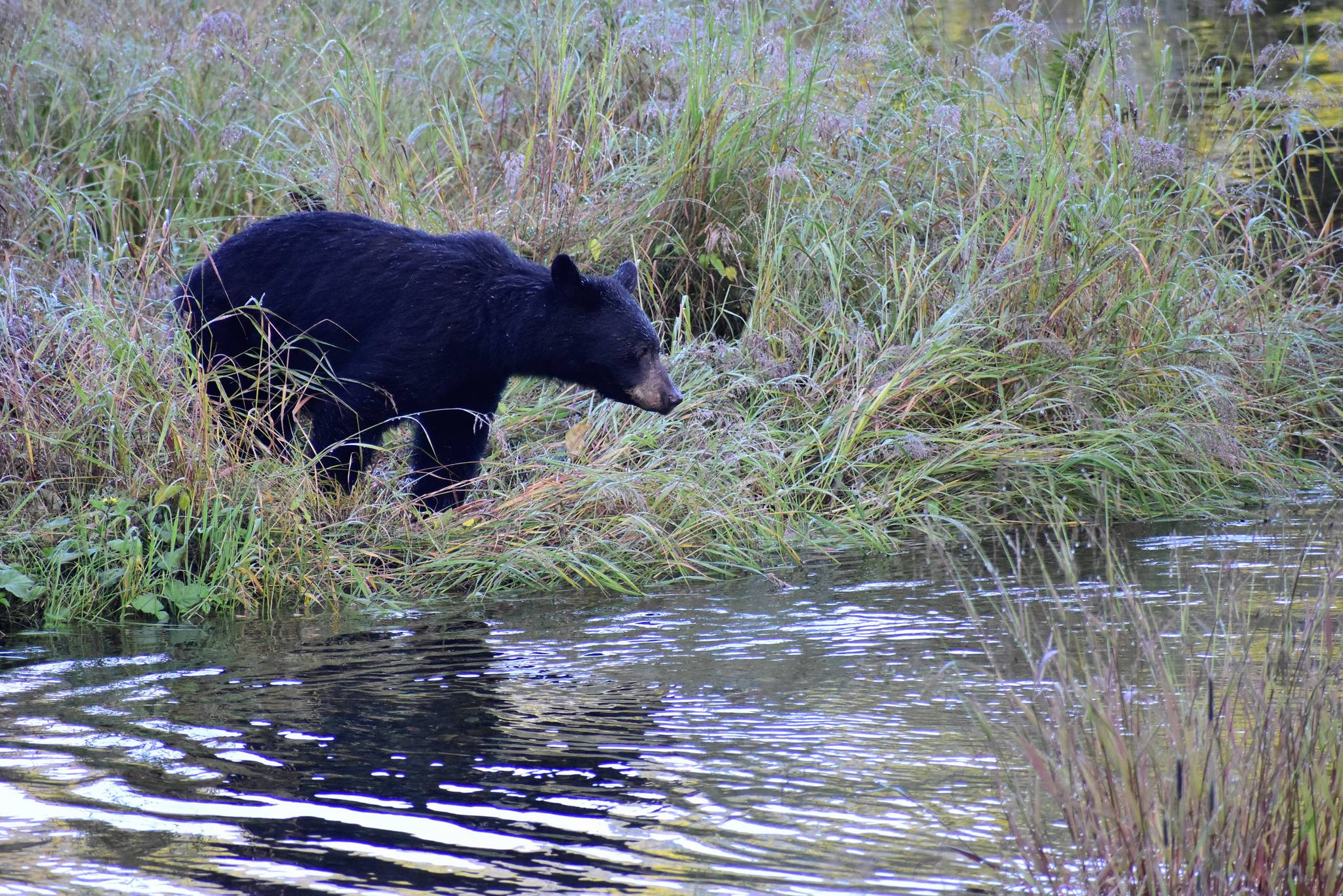Correction: An earlier version of this article incorrectly stated the name of the Juneau resident who posted a video to social media. Her name is Gloria Soto Llauger, not Maria. The Empire regrets the error.
Bears are waking up for the season, and wildlife experts say Juneau residents should take caution when hitting the trails.
“At this time of year, bears are waking up and their very first motivation is food-based,” said Abby McAllister, wildlife education and outreach specialist for the Alaska Department of Fish and Game. “I wouldn’t say they’re cranky, but they’re highly food motivated.”
On Tuesday, Juneau resident Gloria Soto Lluauger posted a video to social media of a mother bear and two cubs wandering through Lemon Creek in the early morning hours. Soto said in a phone interview she’s lived in the area for years and sees bears all the time.
“I love the bears and they’re very cute,” Soto said. “They walk on top of my fence.”
The early morning visitors were the first bears she had seen this year, Soto said, but bears are frequent visitors to her neighborhood.
As the weather gets warmer, wildlife experts are urging Juneauites to be bear-aware.
Juneau’s bears haven’t actually been fully hibernating, McAllister said, but rather in a state called torpor. In torpor metabolic functions are reduced to conserve energy, but the animals can still be woken up, which is not the case with hibernation. Coming out of torpor bears will seek high-protein foods such as grasses, she said, and at this time of year bears can often be found grazing in areas with grass. That includes almost anywhere there’s not snow, McAllister said, like south-facing slopes and along coastal areas.
With spring weather anticipated to bring people out and onto Juneau’s trails, the U.S. Forest Service is urging hikers to be aware of bears when enjoying the outdoors. Dog owners are recommended to keep their pets on a leash so they don’t get into confrontations with bears, and hikers are generally urged to travel in groups or otherwise make noise so as to not startle bears.
[Are more bears wandering in residential areas? It’s hard to say]
“We’re lucky we live in high-quality bear habitat, and that comes with an extra layer of responsibility,” McAllister said.
Someone who encounters a bear in the wild should ask themselves a series of questions about what the bear is doing and the situation, according to McAllister. If the bear is displaying normal behavior the best thing to do is leave the bear alone, she said. If a bear doesn’t notice the hiker, that person should try and leave the area without being seen by the bear, McAllister said.
“If the bear doesn’t notice you don’t need to make it known your there,” she said. “More often than not that bear will retreat.”
However, at this time of year bears will become defensive around food and cubs, McAllister said.
If a hiker encounters a bear showing defensive behaviors such as salivating, they should back away slowly, and calmly talk to the bear. Bears are generally wary of humans, she said, and the human voice has a distinct sound bears will likely recognize.
As bears are seeking out food, wildlife officials are also urging Juneauites to be aware of things around the home that might attract bears such as unsecured garbage or bird feeders.
Last year, there weren’t a lot of natural foods available for bears, according to Roy Churchwell, a biologist with the Department of Fish and Game, which led to a lot of bears looking for food in the urban environment. At this time of year, foods like grasses and dandelions are available outside the city, but as the season progresses vegetation becomes less palatable, he said.
Even with foods available outside of town, there’s nothing stopping bears from looking for food in the urban environment, Churchwell said. Juneauites should take note of things around their yards that may attract bears, he said, like uncleaned cooking grills left outside.
Residents should try to chase bears away from their homes with loud noises, such as banging pots and pans, to let bears know that area is unwelcome, McAllister said. If a bear is repeatedly coming back to a potential food source, residents should contact either the Juneau Police Department or the Department of Fish and Game, she said.
But mostly, McAllister said, it is important to give bears space and let them be a bear.
“Bears don’t want to be messed with, they just want to eat, get fat, do their thing,” McAllister said.
• Contact reporter Peter Segall at psegall@juneauempire.com. Follow him on Twitter at @SegallJnuEmpire.


